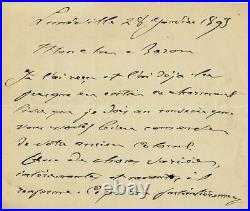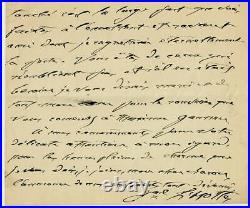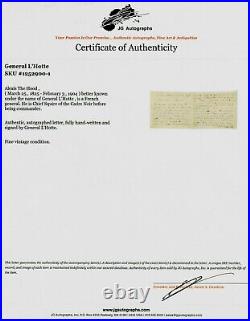General L'Hotte Alexis L'Hotte Hand Written 2 Page Letter JG Autographs COA




"General L'Hotte" Alexis L'Hotte Hand Written 2 Page Letter Dated 1895. This item is certified authentic by JG Autographs and comes with their Certificate of Authenticity. Better known as General L'Hotte, is a French general. He was the chief squire of the. In particular, he is at the origin of this famous doctrine of.
Alexis L'Hotte spent, until the age of 15, more time with Commander Dupuis, squire of the school of. That with his teachers, which will not prevent him from entering. At the age of 17. Two years later, he entered the. School, then under the command of.
And worked with Commander Rousselet. As a cavalry officer, he was then assigned to various "law enforcement" missions. He then becomes aware of the gap between scholarly. And country riding and makes him advocate the practice of the abducted.(then known as English) for men of the rank. To the Staff Guides, he met. Chief squire for a year.
A little later, called to quell the revolt of the. Where he meets by chance. From whom he becomes a pupil and friend. He then began the synthesis between the two rival schools, discerning what the. Method had been unsuited to military riding. As a training lieutenant in 1850. Having become an instructor captain in Lille, he rides twelve horses a day, staying in the saddle thirteen to fourteen hours.Appointed to command the cavalry section of. He was noticed by Emperor.
His appointment as chief squire at Saumur. His first decision was to ban high school work except for his personal horses. This apparent infidelity to Baucher actually shows that perhaps the first, he had understood the fundamental unity of riding with a variety of means. He participated with the Saumur merry-go-round in the first competition of the French Horse Society in.
In 1866 where he won a real triumph. During his six years at Saumur as chief squire, he was truly adored by his students, even though they accused him of being stingy with his advice, which earned him the nicknames of "sublime mute" or "light under the bushel". Indeed, as much as his written work shows his qualities as a teacher, as much as he remained silent or even taciturn at the merry-go-round and quoting Baucher, "I have come to this conclusion that, the more and better we know, the less we say". The Saumur merry-go-round was dissolved and the Hotte, promoted to colonel, commanded the first Dragon and was surrounded in Paris.
He would then often visit Baucher, who was then removed and almost infirm. At the head of the sixth Lancers, he participated with the Versaillais in the bloody repression of the Commune. He will finally triumph over his ideas and the abducted trot will be taught in military riding schools.He ended his military career covered with honours, inspector general of the cavalry, general of the corps, chairman of the council of the cavalry until his retirement in. In 1888, he was elevated to the dignity of Grand Officer of the. Riding his three horses every morning, which he did until the age of 77, he wrote his books A Cavalry Officer, where he camped portraits of the great squires of his time, and especially the Equestrian Questions, synthesis of teaching the two great rivals of whom he was both the pupil and the friend as well as his immense equestrian experience.
These two books were not published until. In his will, he commands, I want to spare my three horses, Glorious, Domfront and Foolish, from decay. Let them be immediately shot with a revolver bullet.
